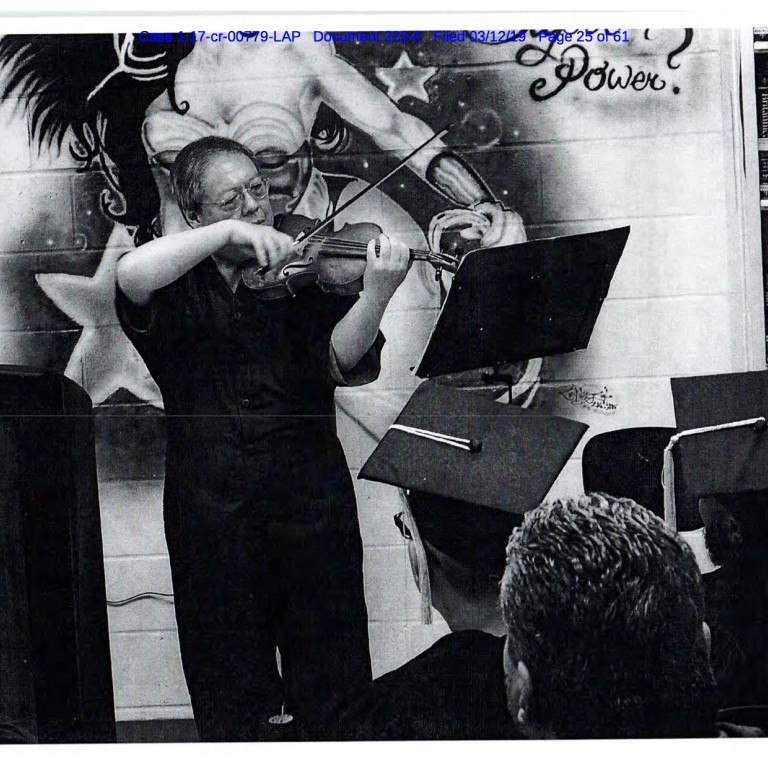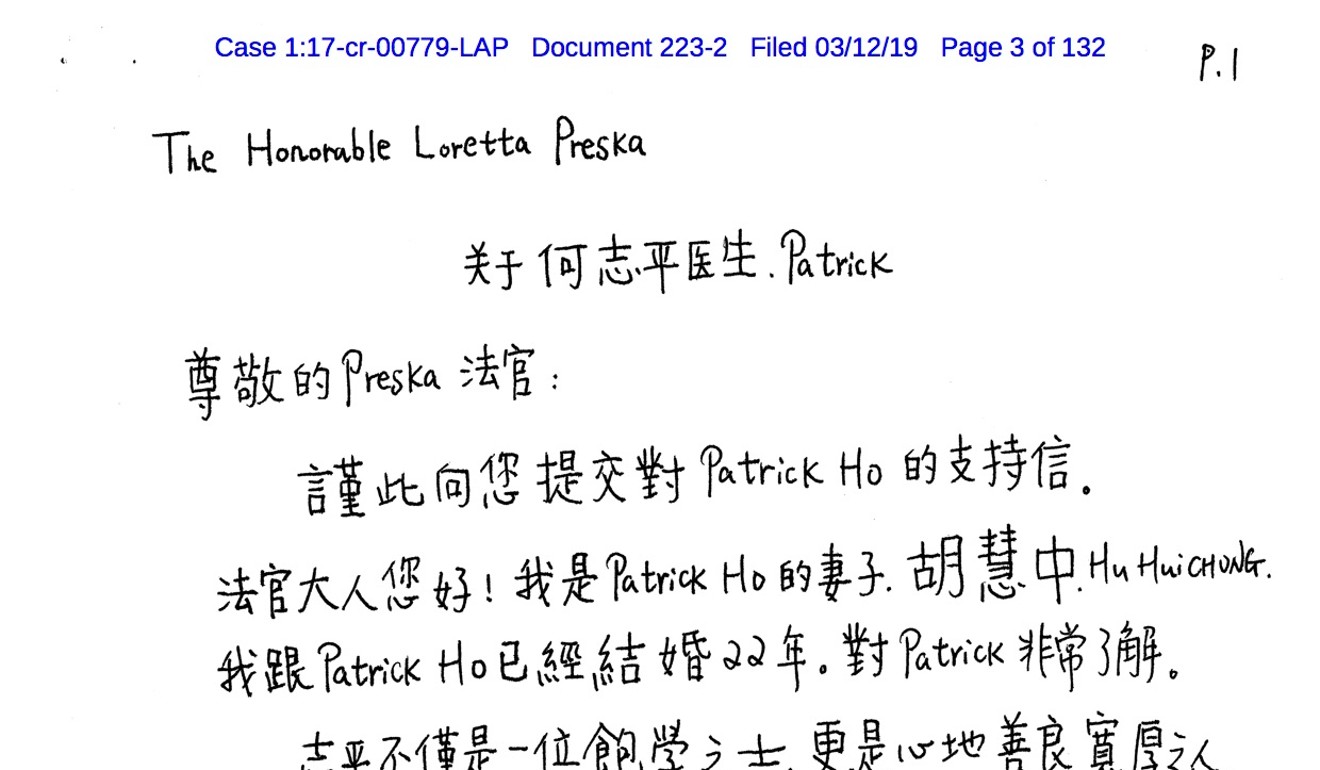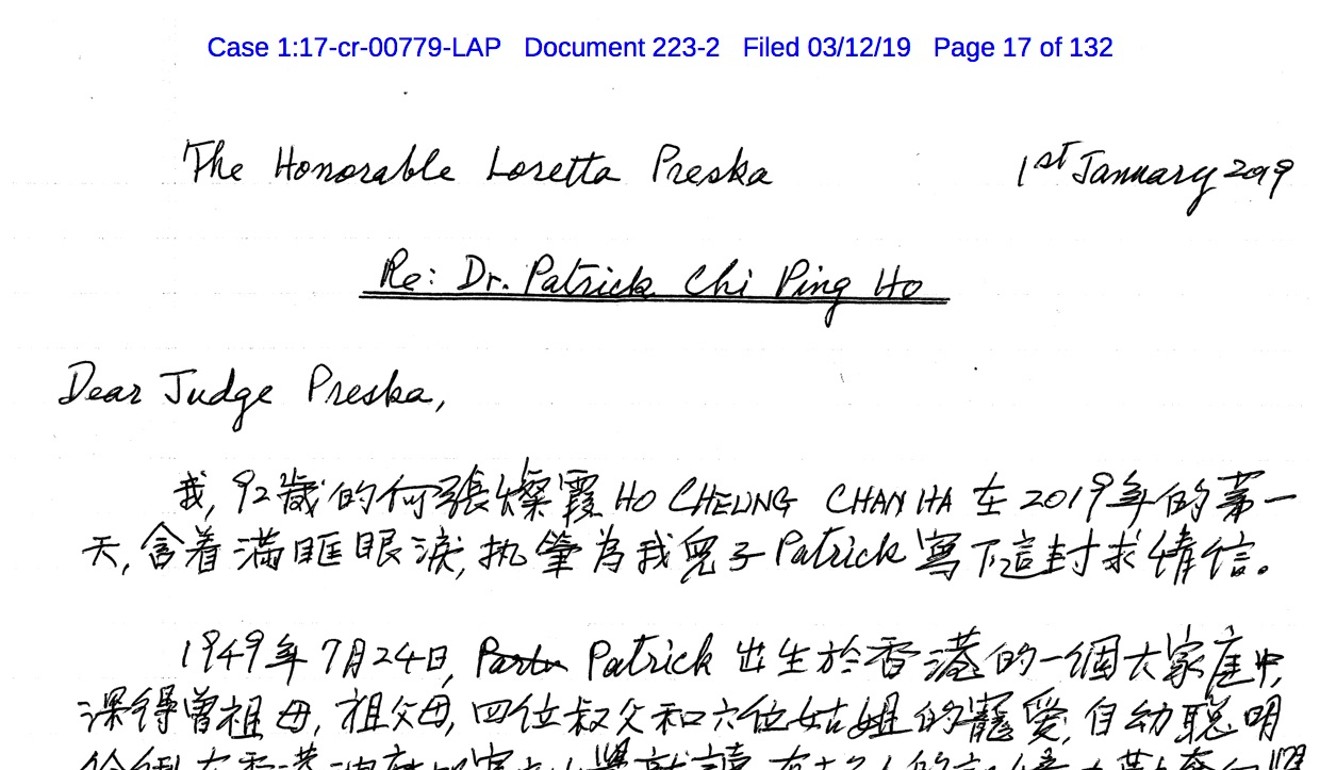
Patrick Ho’s friends and family beg US court for leniency as Africa bribery sentence looms
- Defence asks for Ho’s release on 16 months’ time served and submits 149 letters in support
- Sentencing on March 25 for conviction on seven counts of bribery and money laundering
But as the defence team presented an array of personal references, Ho’s wife said that some of her husband’s old friends and allies had shied away from voicing their support over fears of offending the US government.
Lawyers asked a judge of the Southern District of New York to release Ho, 69, on time served, arguing that the 16 months he had spent in jail were adequate punishment for his conviction last year on seven counts of corruption and money laundering.
Former Hong Kong minister Patrick Ho Chi-ping convicted in US court on 7 of 8 counts in bribery and money-laundering case
“His prosecution and imprisonment have already exacted a profound toll on him,” lawyer Edward Kim wrote in the court filing. “His personal life has been entirely upended, his professional reputation and career have been ruined, he faces serious financial penalties.”
He continued: “Patrick’s fall from grace has been public and severe, and this case already provides a powerful and more than adequate deterrent.”
The defence submitted 149 letters to the court from family, friends, local politicians and former patients from Ho’s time as an accomplished ophthalmologist. There were no letters from incumbent Beijing or Hong Kong officials, or from any heavyweights from the city’s pro-Beijing camp.
Among those who did write were Ho’s mother and his wife of 22 years, Sibelle Hu Hui-chung. Hu wrote she had lost her own mother while Ho was in custody and had been forced to seek work at age 61.

“Words cannot express my pain and sorrow these days. Several times, I have thought of ending my life,” Hu, a former movie star in Taiwan, said in a five-page letter handwritten in Chinese.
Ho Cheung Chan-Ha said her son suffered from deteriorating health and a brain illness that caused him great pain at night.
“I am always fearful that he may pass away in prison,” she wrote. “If I can see my son one more time, I can die in peace.”
In December, Ho was found guilty by a New York federal jury on seven of eight counts of bribery and money laundering in a scheme to secure oil rights in Chad and Uganda for CEFC China Energy, the Chinese oil conglomerate.
The knitter and the latecomer: 12 jurors who decided Patrick Ho’s fate
The convictions were all linked to US$2.9 million in bribes he offered to state leaders and top diplomats, including President Idriss Déby of Chad, Senegalese diplomat Cheikh Gadio and Uganda’s foreign minister, Sam Kutesa.
Ho claimed he was used to “get to the big tiger” and had sought help from the Central Committee of the Communist Party, according to court documents.
Ho’s sentence will be handed down on March 25. The maximum penalty for each bribery count is five years’ imprisonment and 20 years for money laundering.
In 2002, Ho was appointed Hong Kong’s secretary for home affairs by former chief executive Tung Chee-hwa. Ho stepped down in 2007 to help lead a think tank funded by CEFC China, which was meant to promote Beijing’s “Belt and Road Initiative”, a global trade strategy.
Ho was a member of the National People’s Political Consultative Conference, mainland China’s top consultative body, from 1993 to 2013.

The letters of support offered a glimpse into Ho’s wide network of associates made through his careers in medicine and public service.
More than 30 doctors from Hong Kong and mainland China urged the court for a lighter sentence, as did Hong Kong’s former Anglican archbishop Peter Kwong Kong-kit and his successor Archbishop Paul Kwong.
“In the ophthalmic communities of Hong Kong and China, he is a legend and a role model for us,” said Dennis Lam Shun-chiu, one of Hong Kong’s leading ophthalmologists. Lam praised Ho for using his own money to set up an eye clinic at Chinese University.
Trial of Patrick Ho hears key witness Cheikh Gadio ‘went too far’ with talk of deals between Chinese companies and Senegal government
John Hofmeister, a former president of Shell Oil Company, said he met Ho while serving on the US Energy Security Council, which advises the US president on energy and security issues. He said Ho arranged the council’s visits to Beijing and Shanghai, and had paid his own way during the trip.
Ho received fewer than 20 letters from Hong Kong politicians and former officials. Among those who wrote in Ho’s defence were former aid Shelley Lee Lai-kuen, successor Tsang Tat-shing and six former or current lawmakers from the pro-Beijing camp, including Ip Kwok-him.
Tung, the former chief executive, did not lend his support. There will be another window for submitting letters after the prosecution’s response.
Ho’s wife said several old friends and allies turned down requests for supporting letters, even though he had helped them in the past.
“That’s because they feel afraid of offending the United States government, because Chi-Ping is now in a difficult situation, and because Chi-Ping will no longer have a future and has no useful value any more,” Hu wrote.
She also hinted that Ho, a long-time Beijing loyalist, no longer had any political ambitions.
“Even if he could eventually come home, there is not much he can do other than to just live out his life in retirement.”

